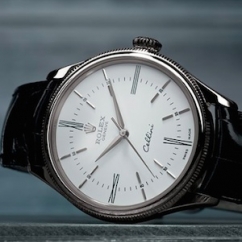Articles and News
Swiss Watch Prices Set To Soar As Franc Is Uncoupled From Euro February 18, 2015 (0 comments)

Merrick, NY—Jewelers heading to Basel next month may get sticker shock in both their hotel bills and their purchase orders. The Swiss National Bank’s decision in January to unpeg the Swiss franc from the Euro already sent ripples through the Zurich stock exchange—a 9% plunge in one day—and is expected to send the cost of Swiss-made goods rocketing. Within the space of an hour on the day the SNB made its surprise announcement, Swiss-made goods literally cost 30% more for European consumers as the value of their euros plummeted against the franc.
In short, if you sell watches, urge your best collector customers to buy now, because prices are most likely heading up.
The news broke just as luxury jewelers from around the world were headed to the Salon International de la Haute Horlogerie (SIHH) show in Geneva last month. The uncoupling took place January 15, just days before the January 19 opening of the show.
Not surprisingly, it was the big topic for discussion at the event, and Nicholas Hayek, CEO of the Swatch Group which owns brands such as Omega, Longines, Tissot and Calvin Klein, had plenty to say about it.
“Words fail me … today’s SNB action is a tsunami; for the export industry and for tourism, and finally for the entire country.”
On January 15, one euro was worth 1.2 Swiss francs. 24 hours later, it was worth just 0.85 francs. The franc leapt against the U.S. dollar, the Chinese Yuan Renminbi, and the Japanese Yen as well, though not quite as drastically as the Euro. The CHF/USD rate went from 0.98 to 1.16 on January 15; at press time it was 1.07. (This blog from The Economist explains why the franc was pegged to the euro in the first place, and why it isn’t anymore.)
Shares in Swatch Group tumbled by 15% on the news, while Compagnie Financière Richemont, which owns luxury names including Cartier, Montblanc, and Baume & Mercier among others, was down 14%.
Richemont had already instituted a mid-single-digit price hike in the Eurozone for all its brands by the time SIHH kicked off four days after the bank’s move. Cartier, for example, announced a 5% price increase in the eurozone, but Baume & Mercier, another Richemont brand, said it would not implement an increase in the U.S. market.
Swiss watchmakers, already grappling with weaker demand in Asia, are extra-vulnerable because they export almost all their production. While all Swiss companies are feeling the same pinch, it’s little consolation. Even though experts advise against raising prices in the U.S. market, eventually Swiss watch companies will have to address the margin/pricing issue on a global scale—including the United States—if the franc stays at its current high levels.
The uncoupling also has been devastating for the Swiss hospitality industry: popular Alpine ski resorts have seen winter holiday bookings plummet. And undoubtedly hotel rooms and restaurants in Basel during the jewelry and watch fair—never cheap to begin with—will be even more costly this year. That could potentially deter some jewelers from attending the fair at all, or force those who do attend to shorten their stay or select a hotel in nearby France or Germany where they can pay for lodging in more dollar-friendly euros.







